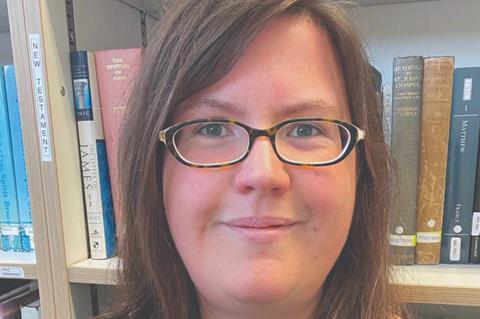- Charlotte Gauthier wanted to save people from believing in God. Encountering the beauty of an ancient church building unexpectedly stopped her in her tracks

I was raised by my grandparents in a post-industrial town about an hour from New York City. By my childhood in the 1990s, Middletown had lost most of its former prosperity, though it still retained the many beautiful churches built in its heyday. My childhood was largely spent in the company of older people, and their stories about life during the war sparked a lifelong love of history. As a shy, serious child I mainly read history books and classic novels. Jane Eyre in particular gave me what grounding I then had in a mature Christian faith.
Though my grandparents were largely silent about their own faith, my grandfather ensured I was baptised, and dutifully took me to the local church each Sunday. Week by week, I chafed at the childishness of Sunday school with its colouring pages and songs about animals going into the ark, and gradually came to think of Christianity as little more than silly stories for babies. In hindsight, I might have come to faith had I been allowed to attend the comparatively intellectual adult service.
My church attendance stopped when, aged eleven, I went to live with my mother. It was then that I found the works of Ayn Rand, which seemed to offer a serious moral philosophy by which I could live. The internet was coming of age around this time, and my first computer offered opportunities for work and for building the community that was lacking in my daily life.
DISCOVERING DAWKINS
While I had never seriously wanted to be anything but an academic historian, I lacked the funds to attend university after graduating high school. For two years I worked full-time in tech to save up and was eventually accepted to study at Columbia University. It was around this time that the ‘New Atheists’ – Dawkins, Dennett, Harris and Hitchens – came to prominence. The version of Christianity they so expertly ridiculed was the same one I had been presented with (and found wanting) as a child.
I consumed all manner of atheist apologetics and attended public lectures by Dawkins et al, feeling vindicated in my contempt for the Christian faith. I even began recording an audiobook of the writings of a now-forgotten 19th-century American atheist, wanting to save people from believing in what I then thought of as nonsense.
THE PROFOUND SACRAMENTAL LIFE OF THE CHURCH HAS SUSTAINED ME THROUGH NUMEROUS TRIALS
At Columbia, I focused on medieval history. One especially memorable course concerned the peace and truce of God, in which the French Church attempted to protect the peasantry from the violence of feudal lords. Despite working full-time during university, lack of funding forced me to leave at the end of my second year. With no prospect of ever completing my studies – let alone becoming an academic – I was heartbroken.
MEDIEVAL THEOLOGY
I had always intended to live in the UK, which has seemed like home since my first visit aged eight. My route took me via jobs in Russia and Germany and, after some significant challenges, I finally arrived here in 2015. Having settled in, I decided to pick up my intellectual pursuits where I’d left off. To my surprise, I was accepted onto an MA course in the history of the Crusades, despite not having completed my first degree.
Everything changed – slowly at first, and then quickly. On the MA I met two tutors (later to become colleagues) who each, in their quiet way, showed what a deep, mature, intellectual Christian faith looked like in practice. Though they never spoke to me about faith, they didn’t need to – their powerful witness was in the way they lived, not in what they said. At the same time, I began to read medieval theology seriously. In Aquinas, Bonaventure, Augustine and others, I found an intellectual Christianity that I could respect. In my arrogant atheist days, I assumed that I’d come up with questions that had never been satisfactorily answered before. I was wrong.
SURPRISED BY HOLINESS
One wet February morning, I arrived at the Priory Church of St Bartholomew the Great in London. My ostensible purpose was to see a breathtaking medieval building and to listen to the professional choir. If another barely acknowledged purpose was to pray for a colleague, I told myself it was not because I thought prayer worked, but because my colleague did.
I encountered holiness that morning – holiness in the truest sense of something being set apart and consecrated to God. The incense, vestments, music and the liturgical actions engaged my senses and brought tears of joy and penitence to my eyes. Here, at last, was an ancient and beautiful mystery in its fullest expression. Here was a ritual that connected me to God and my fellow creatures – both those in the pews around me, and all those who had prayed in that place over 900 years.
Naturally, I told myself that my reaction was mere aesthetic appreciation. I kept attending, however, and was confirmed in 2019. Since then, I’ve edited a book on the history of St Bart’s, have become a sidesman and altar server. The profound sacramental life of the Church, and the community I’ve found there, has sustained me through numerous trials. I’ve recently joined the Diocese of Southwark as assistant director of discipleship, helping people to deepen their faith.
Encountering the holy mysteries as something completely set apart from everyday life gave me the sense of wonder and joy at God’s presence that had been absent from my earlier Christian experience. It also drew me into a community that I had been seeking since childhood. Now I work to share that with others.
Charlotte Gauthier was speaking to Tony Wilson
Visit greenpastures.co.uk to find out how you can help end homelessness in the UK


.jpeg)